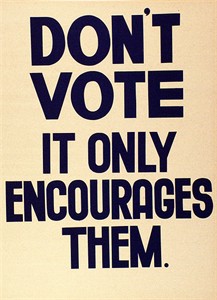“Don’t vote; it only encourages the bastards.” – P. J. O’Rourke
Like Robert Murphy, Gordon Tullock, and Steven Landsburg, I do not vote. 
My reason is largely a utilitarian one: because a candidate will always emerge victorious in an election, an individual’s vote only has consequence if it serves as the tie-breaker. In the absence of a tie, this single vote has no influence on the matter; the same candidate will win the election even without that particular vote. Therefore, if one considers that the value of his vote – merely one in several thousand or million – stems simply from its efficacy towards changing government policy, voting is a waste of time.
Of course, this rationale assumes that the only real value inherent to voting is an instrumental one: voting ceases to serve any real purpose if it fails to affect one’s favored government policy. But surely there exist other reasons for voting. Someone undeterred by all this utilitarian talk can argue that free citizens have some sort of an obligation, a civic duty: a responsibility to remain involved in public life.
But to some extent this argument depends upon whether one believes that the state serves any real purpose beyond a merely instrumental one. A short but accurate explanation of this perspective appears in the introduction of Milton Friedman’s Capitalism and Freedom:
The free man will ask neither what his country can do for him nor what he can do for his country. He will ask rather “What can I and my compatriots do through government” to help us discharge our individual responsibilities, to achieve our several goals and purposes, and above all, to protect ourfreedom?
A person who holds this sort of view does not find a compelling sense of civic duty to vote. For him, only the technical and utilitarian question holds relevance: Will my vote actually make a difference? In nearly all contemporary elections, the large number of other voters eliminates the significance of any one vote.
Or even if one does accept that there exists a duty on the part of every citizen to participate in politics, it is far from clear that voting remains the only form of political involvement. Many citizens participate in the life of the republic through alternative means: working as civil servants, running for political office, or attempting to sway, inform, and shape public opinion. Surely a figure such as David Brooks can do a greater service to his country by writing opinion pieces and intellectually engaging the electorate – and thus has the chance to change not one, but many more votes – than he can by simply voting. Admittedly, this argument, too, has a utilitarian aspect to it, but the point remains: why should voting signify a comparatively greater level of civic involvement, when there conceivably exist other, better ways to influence the nation’s political discourse and to involve oneself in it?
Then again, one’s answer to this question likely depends on deeper beliefs concerning the nature of the state and the role of individual citizens in the workings of a democracy. But even to those who believe in some sort of civic duty to participate in a polity’s electoral process, surely casting a secret and effectively inconsequential vote should not always take precedence over alternative (and more public) means of civic involvement?
In any case, my own rationale for abstaining from the polling booth remains largely a utilitarian one: that the large number of other voters renders my vote ineffectual, unnecessary, and useless. But this is not the case for everybody. When questioned about his own refusal to vote, Gordon Tullock comments that those who feel the duty to vote, or simply enjoy the privilege and doing so, should go ahead and vote.
This act of encouragement also aids the personal cause of my vote-skepticism: my incentive to vote increases as the number of other voters decreases. If a massive number of voters suddenly decided to think in this manner and refused to vote, then this would provide me with a greater incentive to vote, since my individual chances of possibly influencing the election would greatly increase. But as long as Rock the Vote continues to enjoy any measure of success, I will stick to my guns and Mock the Vote.
Photo Credit: National Gallery of Australia.